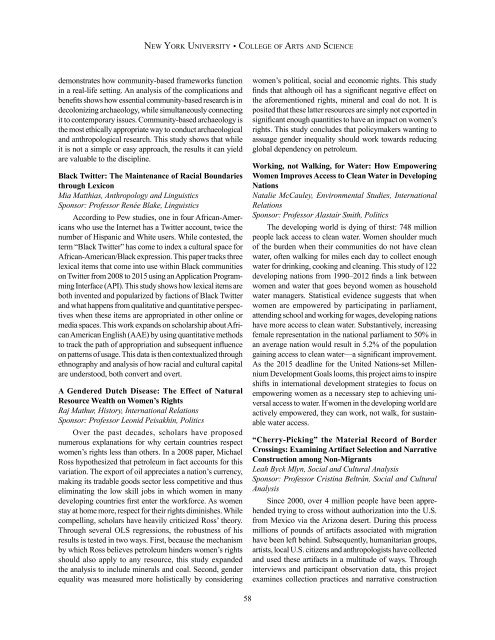INQUIRY
InquiryXIX
InquiryXIX
Create successful ePaper yourself
Turn your PDF publications into a flip-book with our unique Google optimized e-Paper software.
New York University • College of Arts and Science<br />
demonstrates how community-based frameworks function<br />
in a real-life setting. An analysis of the complications and<br />
benefits shows how essential community-based research is in<br />
decolonizing archaeology, while simultaneously connecting<br />
it to contemporary issues. Community-based archaeology is<br />
the most ethically appropriate way to conduct archaeological<br />
and anthropological research. This study shows that while<br />
it is not a simple or easy approach, the results it can yield<br />
are valuable to the discipline.<br />
Black Twitter: The Maintenance of Racial Boundaries<br />
through Lexicon<br />
Mia Matthias, Anthropology and Linguistics<br />
Sponsor: Professor Renée Blake, Linguistics<br />
According to Pew studies, one in four African-Americans<br />
who use the Internet has a Twitter account, twice the<br />
number of Hispanic and White users. While contested, the<br />
term “Black Twitter” has come to index a cultural space for<br />
African-American/Black expression. This paper tracks three<br />
lexical items that come into use within Black communities<br />
on Twitter from 2008 to 2015 using an Application Programming<br />
Interface (API). This study shows how lexical items are<br />
both invented and popularized by factions of Black Twitter<br />
and what happens from qualitative and quantitative perspectives<br />
when these items are appropriated in other online or<br />
media spaces. This work expands on scholarship about African<br />
American English (AAE) by using quantitative methods<br />
to track the path of appropriation and subsequent influence<br />
on patterns of usage. This data is then contextualized through<br />
ethnography and analysis of how racial and cultural capital<br />
are understood, both convert and overt.<br />
A Gendered Dutch Disease: The Effect of Natural<br />
Resource Wealth on Women’s Rights<br />
Raj Mathur, History, International Relations<br />
Sponsor: Professor Leonid Peisakhin, Politics<br />
Over the past decades, scholars have proposed<br />
numerous explanations for why certain countries respect<br />
women’s rights less than others. In a 2008 paper, Michael<br />
Ross hypothesized that petroleum in fact accounts for this<br />
variation. The export of oil appreciates a nation’s currency,<br />
making its tradable goods sector less competitive and thus<br />
eliminating the low skill jobs in which women in many<br />
developing countries first enter the workforce. As women<br />
stay at home more, respect for their rights diminishes. While<br />
compelling, scholars have heavily criticized Ross’ theory.<br />
Through several OLS regressions, the robustness of his<br />
results is tested in two ways. First, because the mechanism<br />
by which Ross believes petroleum hinders women’s rights<br />
should also apply to any resource, this study expanded<br />
the analysis to include minerals and coal. Second, gender<br />
equality was measured more holistically by considering<br />
women’s political, social and economic rights. This study<br />
finds that although oil has a significant negative effect on<br />
the aforementioned rights, mineral and coal do not. It is<br />
posited that these latter resources are simply not exported in<br />
significant enough quantities to have an impact on women’s<br />
rights. This study concludes that policymakers wanting to<br />
assuage gender inequality should work towards reducing<br />
global dependency on petroleum.<br />
Working, not Walking, for Water: How Empowering<br />
Women Improves Access to Clean Water in Developing<br />
Nations<br />
Natalie McCauley, Environmental Studies, International<br />
Relations<br />
Sponsor: Professor Alastair Smith, Politics<br />
The developing world is dying of thirst: 748 million<br />
people lack access to clean water. Women shoulder much<br />
of the burden when their communities do not have clean<br />
water, often walking for miles each day to collect enough<br />
water for drinking, cooking and cleaning. This study of 122<br />
developing nations from 1990–2012 finds a link between<br />
women and water that goes beyond women as household<br />
water managers. Statistical evidence suggests that when<br />
women are empowered by participating in parliament,<br />
attending school and working for wages, developing nations<br />
have more access to clean water. Substantively, increasing<br />
female representation in the national parliament to 50% in<br />
an average nation would result in 5.2% of the population<br />
gaining access to clean water—a significant improvement.<br />
As the 2015 deadline for the United Nations-set Millennium<br />
Development Goals looms, this project aims to inspire<br />
shifts in international development strategies to focus on<br />
empowering women as a necessary step to achieving universal<br />
access to water. If women in the developing world are<br />
actively empowered, they can work, not walk, for sustainable<br />
water access.<br />
“Cherry-Picking” the Material Record of Border<br />
Crossings: Examining Artifact Selection and Narrative<br />
Construction among Non-Migrants<br />
Leah Byck Mlyn, Social and Cultural Analysis<br />
Sponsor: Professor Cristina Beltrán, Social and Cultural<br />
Analysis<br />
Since 2000, over 4 million people have been apprehended<br />
trying to cross without authorization into the U.S.<br />
from Mexico via the Arizona desert. During this process<br />
millions of pounds of artifacts associated with migration<br />
have been left behind. Subsequently, humanitarian groups,<br />
artists, local U.S. citizens and anthropologists have collected<br />
and used these artifacts in a multitude of ways. Through<br />
interviews and participant observation data, this project<br />
examines collection practices and narrative construction<br />
58


